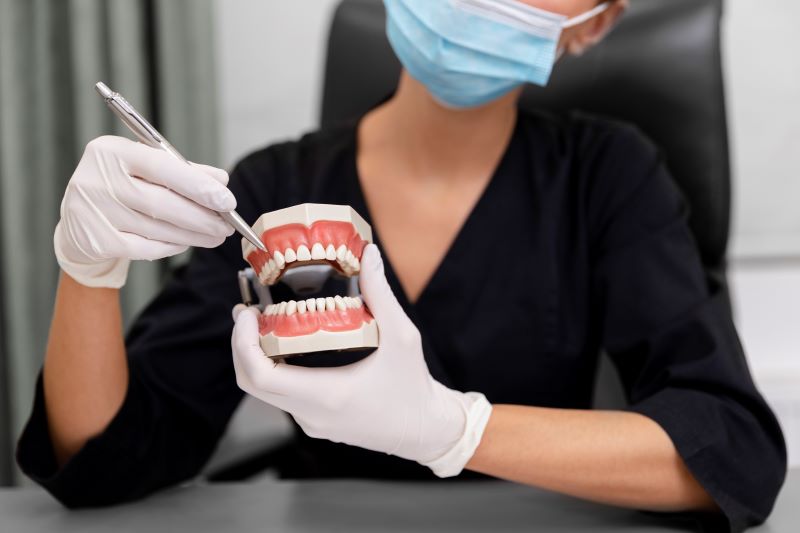
If you wear dentures, you know how important a proper fit is to your comfort and overall oral health. Over time, however, you may begin to notice that your dentures don’t feel quite as snug as they once did. Maybe they slip when you talk, cause irritation, or make it harder to chew. These are all signs that it might be time to consider a denture reline or adjustment.
In this post, we’ll dive into the signs you should look out for, what a reline or adjustment involves, and how often you should visit your dentist denture in Ellenbrook to keep your dentures in tip-top shape.
What Is a Denture Reline or Adjustment?
A denture reline is a procedure that involves reshaping the underside of your denture so that it better conforms to the current contours of your gums. An adjustment, on the other hand, usually refers to smaller tweaks to relieve pressure points, reduce slipping, or fix alignment issues.
Both procedures are common and can significantly improve your comfort, bite, and confidence while wearing dentures. They help extend the life of your dentures without requiring a completely new set.Why Dentures Become Loose Over Time
Our mouths are constantly changing. Bone loss in the jaw is a natural consequence of losing teeth, and the shape of your gums can change with age, weight loss, and other health conditions. Dentures are made to fit your mouth at a specific time, so any change in your oral anatomy can cause them to feel loose or uncomfortable.
If you got your dentures fitted a year or more ago and they don’t feel as secure anymore, this isn’t unusual—it’s just your body evolving. That’s why regular check-ups with a dentist denture Ellenbrook provider are crucial for long-term denture success.
Signs You Might Need a Denture Reline or Adjustment
Here are the most common signs that it’s time to schedule a reline or adjustment:
1. Looseness or Slipping
If your dentures move while you’re talking or eating, that’s a key sign they’re no longer fitting as they should. This can lead to embarrassing moments and make daily tasks more difficult.
2. Sore Spots or Irritation
Ill-fitting dentures can rub against your gums and soft tissue, leading to sores, blisters, or inflammation. A reline smooths the fit and can alleviate this discomfort.
3. Difficulty Eating or Speaking
Struggling to chew food or pronounce certain words is often a result of dentures shifting around in your mouth. An adjustment can improve your bite and restore function.
4. Gum Shrinkage
If you can visibly notice that your gums have receded or changed shape, it’s likely affecting how well your dentures fit. This is especially common in the first few months after tooth loss.
5. Frequent Use of Adhesives
If you’ve started relying heavily on denture adhesives to keep your prosthetics in place, your dentures probably need relining or adjusting.
Types of Denture Relines
There are three main types of relines your dentist might recommend:
- Soft Reline: A cushioned material is used for patients with sensitive gums or sore spots. This type of reline is more comfortable but may not last as long.
- Hard Reline: Involves reshaping the denture base using hard acrylic for a more durable and long-lasting fit.
- Temporary Reline: Typically used when your gums are inflamed or healing, such as right after tooth extraction or surgery. This is a short-term solution until a permanent reline can be done.
Your dentist will help determine which option is best based on your gum health, the age of your dentures, and your lifestyle needs.
How Often Should You Get a Reline or Adjustment?
It’s generally recommended to have your dentures evaluated every 1 to 2 years, but some patients may need adjustments more frequently. Soft relines may need to be redone every 6 to 12 months, while hard relines can last a few years with proper care.
If you’ve had significant changes in your weight, experienced bone loss, or undergone oral surgery, schedule a visit with your denture specialist as soon as possible.
What Happens During the Procedure?
A denture reline is usually a quick and straightforward process. For soft and temporary relines, the procedure is often done in-office in less than an hour. For hard relines, your dentures may be sent to a dental lab, and you’ll be given a temporary replacement or asked to return later that day.
Adjustments for pressure points or small issues can often be made chairside with minor reshaping, trimming, or realignment.
There’s little to no discomfort during the procedure, and you’ll typically walk out with a better-fitting, more comfortable smile.
Don’t Wait—A Better Fit Means Better Health
Ignoring loose or uncomfortable dentures can lead to bigger problems down the road, including infections, gum damage, and difficulties with eating and nutrition. It can also affect your self-esteem and social confidence.
If you’ve noticed any of the signs mentioned above, book a consultation with a denture professional today. Whether you need a minor adjustment or a full reline, you’ll be amazed at how much difference a proper fit can make in your daily life.
Ready to Feel Comfortable in Your Smile Again?
If your dentures are giving you trouble, don’t suffer in silence. Reach out to your local dentist in Ellenbrook and ask about a reline or adjustment. With regular care and the right professional guidance, your dentures can continue to serve you well for years to come.
Read More: Fluoride for Kids: Is It Safe and Necessary?